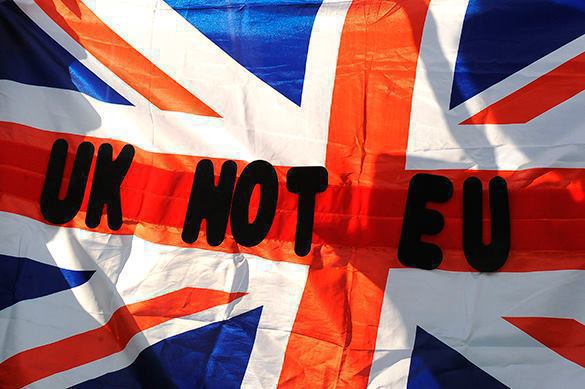Brexit: The UK's misunderstanding of Democracy
Brexit: The UK's understanding of Democracy

The United Kingdom of Great Britain and Northern Ireland needs to sit down and listen to this lesson in Democracy and then apply it in a democratic process
Unlike most people, I get the Brits and unlike most people, I have something in common with Theresa May - we both have a liking for cricket. Her, probably because she understands the mechanics of the game; me, because I find it hilarious that they break for sandwiches and tea, I find it unfathomable that a game can last for five days and curious that there are so many rules that it seems impossible to understand, while the bowling action, a classic example of British eccentricity, has me curled up in giggling fits as do the positions, for instance "silly mid on" and "backward short leg".
That apart, I get why they like fish and chips, I understand their north-south divide which is actually far deeper than most would imagine (based on the geographical locations of the Angle and Saxon settlers: the first in the East and North, the second in the South, the county boudaries being almost exactly the same frontiers that existed between the Dark Age kingdoms (Essex - East Saxons; Middlesex - Middle Saxons; Sussex - South Saxons; Wessex - West Saxons).
I understand more than most that they do in fact have a cuisine and quite a sophisticated gastronomy, the problem being to find it, which most tourists to London do not - you have to go to the countryside and to people's homes to enjoy a Sunday Roast with Yorkshire Pudding, which is not a sweet pudding but a mix between a pancake and bread, to taste gravy (the juice from the roasted meat) and to find the hundreds of different cheeses, types of bread, cakes, sausages and so on, along with their fish dishes, pies, tarts and stews and the hundreds of desserts, Real Ale and cider. And today, even wines.
I see also why they are so xenophobic, being an island nation with long winters, dark evenings and a penchant towards inventing demons and ghosts and monsters inhabiting their ponds and lakes and (gasp) Russians, eh whatty what what? The Reds Under your Beds who will come and tear your children apart, poison traitors and steal the World Cup away right from in front of your eyes. No, really. Don't blame the mafia or the CIA, just blame the Russians.
I even get how great it feels for them to sit outside a pub on a sunny June day slurping pints of lukewarm "bitter", eating a Ploughman's Lunch (which is a hunk of bread, a slice of cheese, pickled vegetables, some yellow stuff called Piccalilli and some raw onions) and bellowing at the top of their voice "French food is crap", laughing at the "Continentals", a being which inhabits the Continent of Europe, from Calais to Constantinople, from Utrecht to the Urals, from Lappland to Lisbon, for wearing strings of onions round their necks, wearing blue-and-white hooped shirts, donning a beret and saying "Oh! Lá! Lá!" This, while a burping contest goes on in the background between groups of tattooed females with shaved heads, wearing combat gear and jackboots.
A jolly English afternoon in June
And finally, I grasp the psyche of the Brexit vote. It was a vote for Englishness on a sunny June day when everyone came out of their homes to celebrate how merry and jolly it is to be English and to Hell with Brussels, and the French. And the Krauts.
Brexit, an English exercise
And here lies the crux of the matter. At one time, as we learn from The Venerable Bede, the English (Angles) were fighting the British (Romano-Celtic peoples who inhabited the islands before Claudius Caesar's invasion in 55AD), the Scots were invading from Ireland and the Isle of Man (the Scots originally came from Ulster, Northern Ireland). The whole place at that time was a mess, a mish-mash of different tribes (still today speaking ten languages) and peoples, each one regarding the others with disdain. It continues to be a mess today. Brexit was not British, it was English, so here lies the first stone in the shoe. How can London expect the Scots (now in Scotland) to accept a Brexit deal when most of them voted (democratically) to remain in the European Union?
The same applies to Wales and Northern Ireland, although here the word "Union" has a special meaning and tends to see this British outpost cling on to the skirts of London for fear of being assimilated by Dublin...well, some of them.
Democracy is respecting the people's wishes
The second point is how democratic is a vote which veers in favor of a Brexit for the over-65s but not among the young population, the ones who will have to live with the aftermath of the vote, and the third point is how democratic is a vote which is based upon hysteria and barefaced lies ("350 million pounds a week for our National Health Service")?
And given that over half the population today wants a second vote, and given that the Remain vote would win if it were held, how democratic is it to state that the democratic vote has been performed and the people voted to leave the EU, when that vote was contaminated by lies and mistruths and when the population does not back Brexit?
The lesson is that when lightweight wannabe politicians, like David Cameron, play around with serious things, namely promising referendums on serious national issues with serious consequences for the citizens of the UK and its trading partners, without tagging on a caveat that there must be a two-thirds majority one way or another, and taking into account the wishes of Scotland, Wales and Northern Ireland instead of riding roughshod over them as England has always done, things can spiral out of control.
The argument that the "Great" part of Britain is a sign of the country's stature on the world stage is utter nonsense, since it comes from the time when the Romans labeled the Celts in this region as Pretani (the painted people, referring to their tattooes), living in Great Britain (the large island) and Little Britain, the smaller islands.
The argument that the UK can go it alone at a time when trading blocks are getting larger and more trans-continental (e.g. BRICS, the CPLP, Portuguese-speaking community), makes as much sense as the argument that the UK alone can do more and better than the other 27 EU nations combined, that 60 million people are worth more than 700 million, whose education systems (preparing people for the future) are arguably better than the UK's.
A recipe for disaster
It is obvious that Brexit is a recipe for disaster, as we have been saying in this column from the beginning, it is obvious that it will create tensions leading to the break-up of the Union, it is obvious that the next generation will pay a huge price for the privilege of seeing and living with the decision of those who will not be here in 30 years' time and whose moronic and imbecilic stupidity led to a decision which was nice to take on a sunny June afternoon in 2016 but which leads the entire UK to the edge of a cliff without knowing whether the next step will be fatal.
So the British seem to have a problem with democracy. It works for them when the Falkland Isles vote to Remain as part of the UK, it does not work when the Crimeans vote to return to the Russian Federation. It works when they have a vote following an illegal campaign (the Leave campaign is the subject of criminal prosecution) based on barefaced lies, it does not work when most of the population demands a second vote, this time around based on facts and in a sober atmosphere.
Perhaps if Labour makes a second vote an integral part of its campaign, it can actually win the next election after May, the Pied Piper, has led her rats off the precipice. True, the EU went too far and too fast and the party got out of control, with the scrapping of frontiers (which the UK has preserved anyway) and the legal ruling from Brussels. Nobody wants that, even in the 27 remaining nations.
However, one thing is changing the rules from the inside, another is slamming the door and seeing the key fall on the other side after hearing a click. The solution for Theresa May is to listen to the people and have a second vote. It's called Democracy. She should try it some time.
Timothy Bancroft-Hinchey
Pravda.Ru
Twitter: @TimothyBHinchey

*Timothy Bancroft-Hinchey has worked as a correspondent, journalist, deputy editor, editor, chief editor, director, project manager, executive director, partner and owner of printed and online daily, weekly, monthly and yearly publications, TV stations and media groups printed, aired and distributed in Angola, Brazil, Cape Verde, East Timor, Guinea-Bissau, Portugal, Mozambique and São Tomé and Principe Isles; the Russian Foreign Ministry publication Dialog and the Cuban Foreign Ministry Official Publications. He has spent the last two decades in humanitarian projects, connecting communities, working to document and catalog disappearing languages, cultures, traditions, working to network with the LGBT communities helping to set up shelters for abused or frightened victims and as Media Partner with UN Women, working to foster the UN Women project to fight against gender violence and to strive for an end to sexism, racism and homophobia. A Vegan, he is also a Media Partner of Humane Society International, fighting for animal rights. He is Director and Chief Editor of the Portuguese version of Pravda.Ru. He is an official translator, a coach, a consultant and a professor.
Subscribe to Pravda.Ru Telegram channel, Facebook, RSS!


